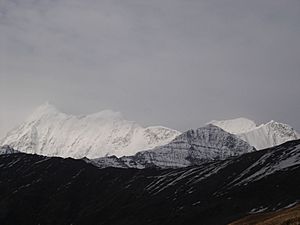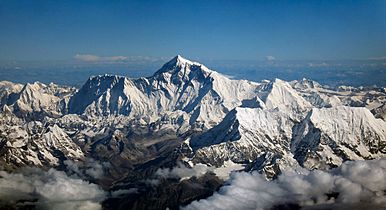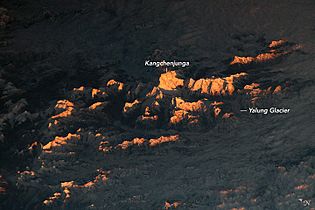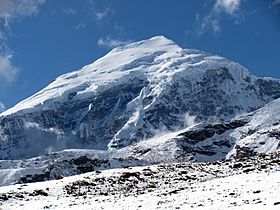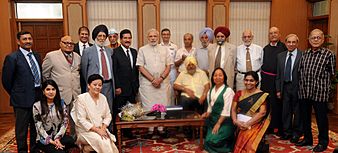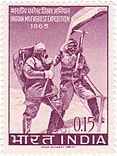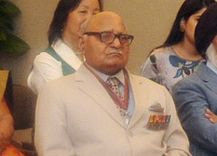Narendra Kumar (mountaineer) facts for kids
Quick facts for kids
Colonel
Narendra Kumar
PVSM, KC, AVSM, FRGS
|
|
|---|---|
| Other name(s) | Narinder Sharma, Bull |
| Nickname(s) | Bull, Jamboree |
| Born | 8 December 1933 Rawalpindi, Punjab, British India (modern-day Pakistan) |
| Died | December 31, 2020 (aged 87) Delhi, India |
| Allegiance | |
| Service/ |
|
| Years of service | 1954–1984 |
| Rank | |
| Service number | IC-6729 |
| Unit | Kumaon Regiment |
| Battles/wars | Operation Meghdoot |
| Awards |
|
Colonel Narendra Kumar (8 December 1933 – 31 December 2020) was a brave Indian soldier and a fantastic mountaineer. He was known for his amazing trips across huge mountain ranges. These included the Himalayas and Karakorams. He explored places like the Pir Panjals and Saltoro Mountains.
His detailed explorations of the Siachen glacier were super important. They helped the Indian Army take back control of key areas in 1984. This mission was called Operation Meghdoot. He was also the second-in-command for the first successful Indian Mount Everest expedition in 1965. Colonel Kumar received many awards for his service. These included the Param Vishisht Seva Medal, Kirti Chakra, and the Padma Shri.
Contents
Early Life and Adventures
Narendra Kumar was born in Rawalpindi, which was part of British India then. This was on December 8, 1933. He grew up in a Punjabi Hindu family. He had three brothers and two sisters. All his brothers, including him, joined the Indian Army.
When he was 13, in 1947, he went to Paris for the World Scout Jamboree. He represented the state of Punjab. When he returned, India had been divided into two countries. His parents had moved to Shimla after this division.
Joining the Army and Climbing Mountains
Kumar joined the Indian Army in 1950. He got the nickname "Bull" during a boxing match. This happened at the Joint Services Wing in Dehradun. He lost the fight, but the nickname stuck with him.
On June 6, 1954, he became a second lieutenant in the Kumaon Regiment. This is a famous part of the Indian Army. While serving, he discovered his love for winter sports and mountaineering.
In 1958, he wanted to take a mountaineering course. This was at the Himalayan Mountaineering Institute (HMI). At first, his commander said no. But Kumar insisted he would skip his vacation to do the course. So, he was allowed to go.
At HMI, he learned from Tenzing Norgay. Tenzing Norgay was one of the first people to climb Mount Everest. Kumar became good friends with him. This experience made him even more passionate about climbing.
First Big Climb: Trishul Mountain
Tenzing Norgay suggested Kumar lead his first expedition. This was to the Trisul mountains. The trip faced money problems at first. Kumar even sold his motorbike and radio to help pay for it.
His team did not have proper climbing gear. They used layers of socks and plastic to keep their feet warm. In March 1958, he successfully led the Army and Navy team up the Trisul mountains. These mountains are about 23,360 feet (7,120 m) high. Later, Kumar achieved an amazing feat. He successfully skied down the Trisul mountains. This was the highest summit ever skied down at that time.
The First Indian Everest Expedition
In 1959, the Indian government planned an Everest expedition. Kumar, who was still recovering from his last trip's costs, helped raise money. He contributed ₹50,000 (equivalent to ₹4.5 million or US$76,000 in 2023) to the expedition.
A practice climb helped choose the final team. Kumar made it onto the list. The team was well-prepared and had good equipment. It included five climbers, a doctor, and many helpers. Even though they were ready, the team could not reach the very top. But Kumar became the first Indian to climb to 28,700 feet (8,700 m). On June 6, 1960, he was promoted to captain.
Exploring More Mountains
One of Kumar's first army missions was to Barahoti. This area was also claimed by China. Prime Minister Nehru himself asked Kumar if he was ready. Kumar chose his team carefully. They successfully completed the mission. Prime Minister Nehru congratulated him.
In 1961, he led a team to climb Neelkanth in the Garhwal Himalayas. This mountain is about 21,644 feet (6,597 m) high. During this trip, he suffered frostbite and lost four toes. He had to stop just 200 meters from the top. In 1964, he became the first Indian to climb Nanda Devi. This is India's second-highest peak.
Everest, Kangchenjunga, and Beyond
In 1965, Kumar was the deputy leader of the 1965 Indian Everest Expedition. This time, the team successfully reached the summit of Mount Everest. In 1970, he led the first known climb of Jomolhari. This is the highest mountain in Bhutan, at 23,997 feet (7,314 m). The King of Bhutan supported this expedition.
On June 9, 1966, Kumar became the Principal of the Himalayan Mountaineering Institute. He was promoted to major the next year. In 1977, Kumar led the first successful climb of Kangchenjunga. This is the third highest mountain in the world. Many expeditions had tried and failed for 45 years. On May 31, 1977, two members of his team reached the top.
Kumar was promoted to colonel on March 2, 1979. He continued his adventures. In 1983, he climbed Kamet (25,595 feet (7,801 m)) and Abi Gamin (24,272 feet (7,398 m)). He climbed above 8,000 metres (26,000 ft) on Mount Everest more than twenty times. He also led the High Altitude Warfare School in Gulmarg. Kumar also made the first rafting trips down the Indus River in Ladakh and the Teesta in Sikkim. He retired from the Indian Army in 1984.
Siachen Glacier Expeditions
Colonel Kumar's work on the Siachen Glacier was very important. In 1977, he noticed a mistake on a map. This map incorrectly showed the border between India and Pakistan. Kumar took his findings to a senior army officer in 1978. He got permission to lead a special mission to the glacier.
His team started at the bottom of the glacier. They climbed to the middle. From there, three climbers reached the top of Teram Kangri II. This mountain is 24,631 feet (7,508 m) high. The Indian Air Force helped them with food and supplies. The team found things left behind by Pakistan. This showed Pakistan had been in the area.
In April 1981, Kumar returned to Siachen with 70 team members. This time, they started from the Saltoro Mountains. He became the first person to climb the Siachen Glacier. This is the world's second-longest non-polar glacier. Over eight weeks, his team climbed several peaks. They also hiked to Indira Col and skied across many passes.
Kumar wrote about his expeditions in magazines. His detailed maps, photos, and videos were crucial. They helped the Prime Minister of India, Indira Gandhi, approve Operation Meghdoot. This operation ended Pakistan's control of parts of the glacier. An officer called Kumar "a mountain of information."
Personal Life
Colonel Kumar married Mridula Sadgopal on February 21, 1966. Their daughter, Shailaja Kumar, was born in 1967. She became the first Indian female winter Olympian. She competed in alpine skiing at the 1988 Winter Olympics in Canada.
Their son, Akshay Kumar, ran an adventure travel company. In 1985, Kumar's youngest brother, Major K. I. Kumar, also climbed Mount Everest. Sadly, he died during a fall from 8,500 meters. Colonel Kumar went back to Everest to retrieve his brother's body. This was his last time on Everest.
Colonel Kumar lived in Delhi. He passed away at the Army Research and Referral Hospital in Delhi on December 31, 2020. He was 87 years old.
Awards and Honors
- Top: Prime Minister Modi meets the members of the Indian Everest Expedition 1965 on the Golden Jubilee of the occasion in 2015. Kumar is on the left, second from end.
- Bottom right: Narender Kumar at the meet.
- Bottom left: A 1965 Indian stamp dedicated to the 1965 Everest Expedition
Colonel Kumar received many military and civilian awards. These recognized his amazing mountaineering achievements. He was given the Padma Shri in 1965. This is India's fourth-highest civilian honor. He also received the Arjuna Award for sports.
He is the only Colonel to have received the Param Vishisht Seva Medal. He also earned the Army's Kirti Chakra and Ati Vishisht Seva Medal. The Indian Mountaineering Foundation gave him a gold medal. In 2010, he received the MacGregor Medal. This was for his military exploration of remote Indian areas. Kumar was also a Fellow of the Royal Geographical Society.
The Indian Army's Siachen Battalion HQ is named "Kumar Base" in his honor. This base is an important supply point. He also received a United Nations fellowship for ski teaching. He trained as a ski-trainer in Austria and Switzerland.
- Medal bar
| Param Vishisht Seva Medal | Kirti Chakra | Padma Shri | MacGregor Medal |
| Ati Vishisht Seva Medal | General Service Medal 1947 | Samanya Seva Medal | Special Service Medal |
| Raksha Medal | Sangram Medal | Sainya Seva Medal (clasp for Jammu and Kashmir) |
High Altitude Service Medal |
| 25th Anniversary of Independence Medal | 30 Years Long Service Medal | 20 Years Long Service Medal | 9 Years Long Service Medal |
See Also
- Mountain warfare
- Oropolitics
- Khardung La
- Actual Ground Position Line
- Bana Singh
- Indian summiters of Mount Everest - Year wise
- List of Mount Everest summiters by number of times to the summit
- List of Mount Everest records of India
- List of Mount Everest records
- Siachen Base Camp (India)


